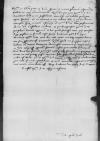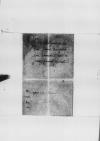Letter #4779
Tiedemann GIESE to Ioannes DANTISCUSLöbau (Lubawa), 1539-06-28
| received [1539]-06-29 Manuscript sources:
Auxiliary sources:
| ||||||
Text & apparatus & commentaryPlain textText & commentaryText & apparatus
Reverendissimo in Christo Patri et Domino, domino
Reverendissime in Christo Pater et Domine, frater et maior plurimum observande. Salutem et mei commendationem.
Cum hic servitor Reverendissimae Dominationis Vestrae huc divertens litteras a me postularet, tametsi non habebam, quod praecipue scriberem, tamen ne vacuus a me abiret, dedi ei cum his litteris exemplum litterarum civitatum referendum ad Reverendissimam Dominationem Vestram, item litteras posteriores ad me domini
Datae
Eiusdem Reverendissimae Dominationis Vestrae obsequentissimus

